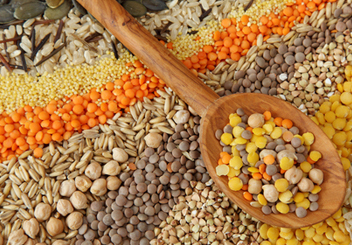Being a vegetarian of Ashkenazi descent, Passover has always had its challenges with many staple forms of protein being off the menu. But now that the Conservative Movement has approved Ashkenazi Jews incorporating kitniyot into their Passover diet, I'm re-thinking my foodie traditions.
I come from a particularly intense foodie family. My Nana's parents owned a Kosher restaurant, "Cohen's," originally in Hazelton, Pennsylvania, then in Philadelphia, located strategically across from Bershad's Russian and Turkish Baths. While my mother grew up in a strictly Kosher environment; our home was "Kosher Style." Even though our family wasn't as observant as hers, we retained many of my extended family's traditions especially during Passover. My mother's main goal was to make the week of Passover different, which meant not eating the foods we ate the rest of the year including foods that were permissible, even for Ashkenazi Jews -- our version of Lent. After all, we don't ask, "Why is this night different from all other nights?" for nothing. For example, we didn't eat chocolate, ice cream, hard cheeses and mayonnaise (ruling out tuna salad, egg salad, etc.). There were various rationalizations for this with the main one being that we didn't eat foods that weren't accessible to the Jews wandering through the desert. (We never questioned the fact that they also didn't have electricity to cook their food, but that's a technicality.) A few years ago I began trying to make sense of it all. I surmised that our limited dairy during Passover was due to the fact that when my mother was growing up, her family only used fleishig (meat) dishes through the holiday. Eating dairy wasn't part of her holiday tradition, so a version of that carried into our Kosher Style home. And just as God didn't literally "take us out of Egypt with a strong hand and an outstretched arm," when my mother said we couldn't eat foods they didn't have in the desert, she didn't literally mean that. Another part of her Passover goal was for us to stick to basic foods, to forgo overly processed foods. I must say, it was a wonderful treat at the end of the week to have chocolate and ice cream. My mother tells the story that whenever Passover coincided with Easter, her aunt would buy a large elaborately decorated Easter Egg before the holiday, which sat for the week in their antique curio cabinet among the other treasures. She would peer at it through the glass; quite a temptation for a little girl, made all the more delicious after her week of restraint.
As a vegetarian for nearly 30 years, I've done a lot of thinking about meatless Jewish holiday celebrations, particularly the Passover Seder. Just as my ancestors needed to adapt and create new traditions when they made their journey to America, we have created new ones too. My mother has been very sensitive to our family's dietary needs. For our Passover Seder, she makes a chicken-less version of matzoh ball soup and a meatless version of her hot beet borscht. But even though the Conservative Movement has sanctioned eating kitniyot during Passover, my 89-year-old mother says she's going to keep to her Ashkenazi traditions. I'm not surprised. It does feel a bit like going against the grain for me as well. What will make the week feel different if I'm eating nearly all the same foods I eat the rest of the year? The rational side of me knows that there was no real logic to the prohibitions against those foods in the first place, but it will take a little getting used to. On the other hand, ever since I learned about the Rhineland Hypothesis, I've believed that I am one of the many Ashkenazi women who have descended from Italian converts. If it hadn't been for migration, kitniyot, would have been part of my Sephardic tradition all along.
I wonder if they had Gelato in the desert.

